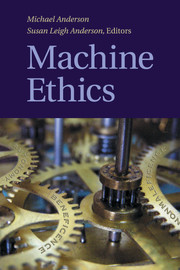Book contents
- Frontmatter
- Contents
- General Introduction
- PART I THE NATURE OF MACHINE ETHICS
- PART II THE IMPORTANCE OF MACHINE ETHICS
- PART III ISSUES CONCERNING MACHINE ETHICS
- PART IV APPROACHES TO MACHINE ETHICS
- Introduction
- 14 Towards the Ethical Robot
- 15 Asimov's Laws of Robotics
- 16 The Unacceptability of Asimov's Three Laws of Robotics as a Basis for Machine Ethics
- 17 Computational Models of Ethical Reasoning
- 18 Computational Neural Modeling and the Philosophy of Ethics
- 19 Architectures and Ethics for Robots
- 20 Piagetian Roboethics via Category Theory
- 21 Ethical Protocols Design
- 22 Modeling Morality with Prospective Logic
- 23 An Integrated Reasoning Approach to Moral Decision Making
- 24 Prototyping N-Reasons
- 25 There Is No “I” in “Robot”
- 26 Prospects for a Kantian Machine
- 27 A Prima Facie Duty Approach to Machine Ethics
- PART V VISIONS FOR MACHINE ETHICS
- References
26 - Prospects for a Kantian Machine
from PART IV - APPROACHES TO MACHINE ETHICS
Published online by Cambridge University Press: 01 June 2011
- Frontmatter
- Contents
- General Introduction
- PART I THE NATURE OF MACHINE ETHICS
- PART II THE IMPORTANCE OF MACHINE ETHICS
- PART III ISSUES CONCERNING MACHINE ETHICS
- PART IV APPROACHES TO MACHINE ETHICS
- Introduction
- 14 Towards the Ethical Robot
- 15 Asimov's Laws of Robotics
- 16 The Unacceptability of Asimov's Three Laws of Robotics as a Basis for Machine Ethics
- 17 Computational Models of Ethical Reasoning
- 18 Computational Neural Modeling and the Philosophy of Ethics
- 19 Architectures and Ethics for Robots
- 20 Piagetian Roboethics via Category Theory
- 21 Ethical Protocols Design
- 22 Modeling Morality with Prospective Logic
- 23 An Integrated Reasoning Approach to Moral Decision Making
- 24 Prototyping N-Reasons
- 25 There Is No “I” in “Robot”
- 26 Prospects for a Kantian Machine
- 27 A Prima Facie Duty Approach to Machine Ethics
- PART V VISIONS FOR MACHINE ETHICS
- References
Summary
One way to view the puzzle of machine ethics is to consider how we might program computers that will themselves refrain from evil and perhaps promote good. Consider some steps along the way to that goal. Humans have many ways to be ethical or unethical by means of an artifact or tool; they can quell a senseless riot by broadcasting a speech on television or use a hammer to kill someone. We get closer to machine ethics when the tool is a computer that's programmed to effect good as a result of the programmer's intentions. But to be ethical in a deeper sense – to be ethical in themselves – machines must have something like practical reasoning that results in action that causes or avoids morally relevant harm or benefit. So, the central question of machine ethics asks whether the machine could exhibit a simulacrum of ethical deliberation. It will be no slight to the machine if all it achieves is a simulacrum. It could be that a great many humans do no better.
Rule-based ethical theories like Immanuel Kant's appear to be promising for machine ethics because they offer a computational structure for judgment.
Of course, philosophers have long disagreed about what constitutes proper ethical deliberation in humans. The utilitarian tradition holds that it's essentially arithmetic: we reach the right ethical conclusion by calculating the prospective utility for all individuals who will be affected by a set of possible actions and then choosing the action that promises to maximize total utility.
- Type
- Chapter
- Information
- Machine Ethics , pp. 464 - 475Publisher: Cambridge University PressPrint publication year: 2011
References
- 14
- Cited by



